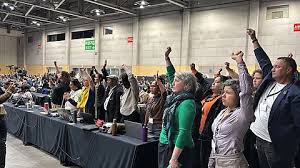Just Transition in the Global Plastics Treaty:

The negotiations for the Global Plastics Treaty initiated under the United Nations Environment Assembly (UNEA) resolution 5/14 (March 2022), have brought attention to the need for a Just Transition ensuring that efforts to end plastic pollution are both environmentally sustainable and socially fair.
- Part one of the 5th session of the Intergovernmental Negotiating Committee (INC-5.1) on plastic pollution held in Busan (2024) emphasized the need for stronger legal recognition and protections for informal waste workers and other vulnerable communities.
- A just transition ensures fairness and inclusivity in the shift to low-carbon, sustainable economies by protecting workers and vulnerable communities.
- It seeks to avoid creating new injustices while trying to fix existing ones.
- It promotes green jobs, retraining, and social protection, especially for informal waste workers.
- Workers across the value chain (from production to disposal) are at risk of exclusion or economic displacement as countries move towards banning plastics and promoting sustainable alternatives.
- Informal waste pickers contribute significantly to plastic recycling
- The draft Global Plastics Treaty recognizes waste pickers’ contributions but lacks binding protections.
- It fails to define their roles in informal sectors, and Articles 8 and 9 of the Treaty merely encourage inclusion without mandating obligations, excluding informal workers from engagement. Article 11 lacks financial support for just transition programs.
- A ‘Just Transition’ ensures waste pickers are not marginalized in the shift to sustainability. Without binding protections, they risk economic displacement. A clear framework is essential for their inclusion, social protection, and retraining for greener jobs.
- India agrees with Just Transition provisions but stresses that implementation should align with national regulations and local contexts.
- At INC-5.1 in Busan, India called for a clear scope for the Global Plastics Treaty. It urged avoiding overlaps with existing agreements like the Basel, Rotterdam, and Stockholm Conventions or the World Trade Organization (WTO).
- India also stressed the treaty must follow Rio Declaration (1992) principles, especially common but differentiated responsibilities, national priorities, and the right to development for developing countries.




